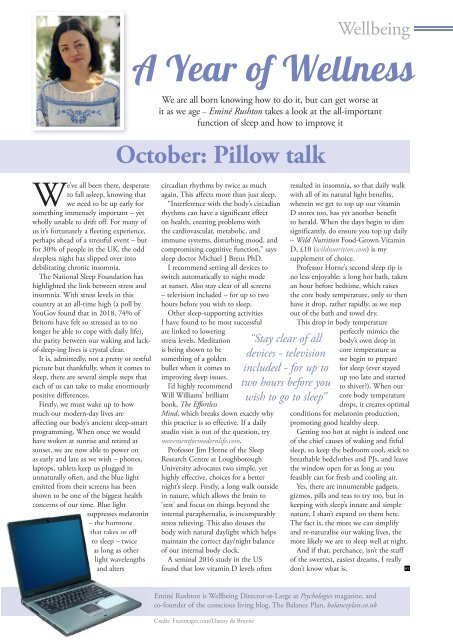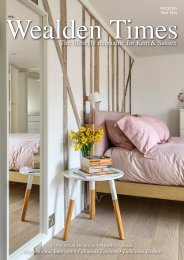Wealden Times | WT200 | October 2018 | Kitchen & Bathroom supplement inside
Wealden Times - The lifestyle magazine for the Weald
Wealden Times - The lifestyle magazine for the Weald
Create successful ePaper yourself
Turn your PDF publications into a flip-book with our unique Google optimized e-Paper software.
Wellbeing<br />
A Year of Wellness<br />
We are all born knowing how to do it, but can get worse at<br />
it as we age – Eminé Rushton takes a look at the all-important<br />
function of sleep and how to improve it<br />
<strong>October</strong>: Pillow talk<br />
We’ve all been there, desperate<br />
to fall asleep, knowing that<br />
we need to be up early for<br />
something immensely important – yet<br />
wholly unable to drift off. For many of<br />
us it’s fortunately a fleeting experience,<br />
perhaps ahead of a stressful event – but<br />
for 30% of people in the UK, the odd<br />
sleepless night has slipped over into<br />
debilitating chronic insomnia.<br />
The National Sleep Foundation has<br />
highlighted the link between stress and<br />
insomnia. With stress levels in this<br />
country at an all-time high (a poll by<br />
YouGov found that in <strong>2018</strong>, 74% of<br />
Britons have felt so stressed as to no<br />
longer be able to cope with daily life),<br />
the parity between our waking and lackof-sleep-ing<br />
lives is crystal clear.<br />
It is, admittedly, not a pretty or restful<br />
picture but thankfully, when it comes to<br />
sleep, there are several simple steps that<br />
each of us can take to make enormously<br />
positive differences.<br />
Firstly, we must wake up to how<br />
much our modern-day lives are<br />
affecting our body’s ancient sleep-smart<br />
programming. When once we would<br />
have woken at sunrise and retired at<br />
sunset, we are now able to power on<br />
as early and late as we wish – phones,<br />
laptops, tablets keep us plugged in<br />
unnaturally often, and the blue light<br />
emitted from their screens has been<br />
shown to be one of the biggest health<br />
concerns of our time. Blue light<br />
suppresses melatonin<br />
– the hormone<br />
that takes us off<br />
to sleep – twice<br />
as long as other<br />
light wavelengths<br />
and alters<br />
circadian rhythms by twice as much<br />
again. This affects more than just sleep.<br />
“Interference with the body’s circadian<br />
rhythms can have a significant effect<br />
on health, creating problems with<br />
the cardiovascular, metabolic, and<br />
immune systems, disturbing mood, and<br />
compromising cognitive function,” says<br />
sleep doctor Michael J Breus PhD.<br />
I recommend setting all devices to<br />
switch automatically to night mode<br />
at sunset. Also stay clear of all screens<br />
– television included – for up to two<br />
hours before you wish to sleep.<br />
Other sleep-supporting activities<br />
I have found to be most successful<br />
are linked to lowering<br />
stress levels. Meditation<br />
is being shown to be<br />
something of a golden<br />
bullet when it comes to<br />
improving sleep issues.<br />
I’d highly recommend<br />
Will Williams’ brilliant<br />
book, The Effortless<br />
Mind, which breaks down exactly why<br />
this practice is so effective. If a daily<br />
studio visit is out of the question, try<br />
movementformodernlife.com.<br />
Professor Jim Horne of the Sleep<br />
Research Centre at Loughborough<br />
University advocates two simple, yet<br />
highly effective, choices for a better<br />
night’s sleep. Firstly, a long walk outside<br />
in nature, which allows the brain to<br />
‘rest’ and focus on things beyond the<br />
internal paraphernalia, is incomparably<br />
stress relieving. This also douses the<br />
body with natural daylight which helps<br />
maintain the correct day/night balance<br />
of our internal body clock.<br />
A seminal 2016 study in the US<br />
found that low vitamin D levels often<br />
“Stay clear of all<br />
devices - television<br />
included - for up to<br />
two hours before you<br />
wish to go to sleep”<br />
resulted in insomnia, so that daily walk<br />
with all of its natural light benefits,<br />
wherein we get to top up our vitamin<br />
D stores too, has yet another benefit<br />
to herald. When the days begin to dim<br />
significantly, do ensure you top up daily<br />
– Wild Nutrition Food-Grown Vitamin<br />
D, £10 (wildnutrition.com) is my<br />
<strong>supplement</strong> of choice.<br />
Professor Horne’s second sleep tip is<br />
no less enjoyable: a long hot bath, taken<br />
an hour before bedtime, which raises<br />
the core body temperature, only to then<br />
have it drop, rather rapidly, as we step<br />
out of the bath and towel dry.<br />
This drop in body temperature<br />
perfectly mimics the<br />
body’s own drop in<br />
core temperature as<br />
we begin to prepare<br />
for sleep (ever stayed<br />
up too late and started<br />
to shiver?). When our<br />
core body temperature<br />
drops, it creates optimal<br />
conditions for melatonin production,<br />
promoting good healthy sleep.<br />
Getting too hot at night is indeed one<br />
of the chief causes of waking and fitful<br />
sleep, so keep the bedroom cool, stick to<br />
breathable bedclothes and PJs, and leave<br />
the window open for as long as you<br />
feasibly can for fresh and cooling air.<br />
Yes, there are innumerable gadgets,<br />
gizmos, pills and teas to try too, but in<br />
keeping with sleep’s innate and simple<br />
nature, I shan’t expand on them here.<br />
The fact is, the more we can simplify<br />
and re-naturalise our waking lives, the<br />
more likely we are to sleep well at night.<br />
And if that, perchance, isn’t the stuff<br />
of the sweetest, easiest dreams, I really<br />
don’t know what is.<br />
Eminé Rushton is Wellbeing Director-at-Large at Psychologies magazine, and<br />
co-founder of the conscious living blog, The Balance Plan, balanceplan.co.uk<br />
Credit: Freeimages.com/Danny de Bruyne


















